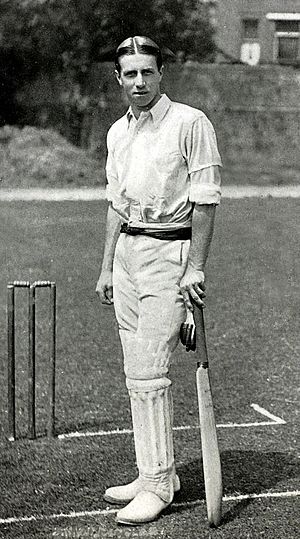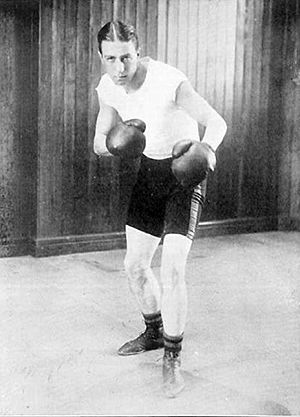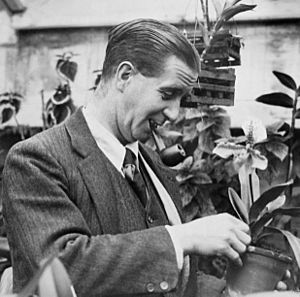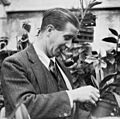Johnny Douglas facts for kids

Douglas c. 1906
|
||||||||||||||||||||||||||||||||||||||||
| Personal information | ||||||||||||||||||||||||||||||||||||||||
|---|---|---|---|---|---|---|---|---|---|---|---|---|---|---|---|---|---|---|---|---|---|---|---|---|---|---|---|---|---|---|---|---|---|---|---|---|---|---|---|---|
| Full name |
John William Henry Tyler Douglas
|
|||||||||||||||||||||||||||||||||||||||
| Born | 3 September 1882 Stoke Newington, London, England |
|||||||||||||||||||||||||||||||||||||||
| Died | 19 December 1930 (aged 48) at sea, seven miles south of the Læsø Trindel Lightship, Denmark |
|||||||||||||||||||||||||||||||||||||||
| Batting | Right-handed | |||||||||||||||||||||||||||||||||||||||
| Bowling | Right arm fast-medium | |||||||||||||||||||||||||||||||||||||||
| International information | ||||||||||||||||||||||||||||||||||||||||
| National side | ||||||||||||||||||||||||||||||||||||||||
| Test debut (cap 170) | 15 December 1911 v Australia | |||||||||||||||||||||||||||||||||||||||
| Last Test | 8 January 1925 v Australia | |||||||||||||||||||||||||||||||||||||||
| Domestic team information | ||||||||||||||||||||||||||||||||||||||||
| Years | Team | |||||||||||||||||||||||||||||||||||||||
| 1901–1928 | Essex | |||||||||||||||||||||||||||||||||||||||
| 1903–1904 | London County | |||||||||||||||||||||||||||||||||||||||
| Career statistics | ||||||||||||||||||||||||||||||||||||||||
|
||||||||||||||||||||||||||||||||||||||||
|
Source: Cricinfo, 11 November 2008
|
||||||||||||||||||||||||||||||||||||||||

Douglas as a boxer at the 1908 Olympics
|
|||||||||||
| Sport | |||||||||||
|---|---|---|---|---|---|---|---|---|---|---|---|
| Sport | Boxing | ||||||||||
| Club | Belsize BC, Hampstead | ||||||||||
|
Medal record
|
|||||||||||
John William Henry Tyler Douglas (born September 3, 1882 – died December 19, 1930) was a famous English sportsman. He was a talented cricketer and also a skilled boxer. Johnny Douglas played cricket for Essex County Cricket Club and was the captain for many years. He also led the England team in Test matches.
Douglas was known as an all-rounder in cricket. This means he was very good at both batting and bowling. Besides cricket, he achieved something amazing in boxing: he won a gold medal at the 1908 Olympic Games.
Contents
Early Life & Education
Johnny Douglas was born in Stoke Newington, London. His father was a successful businessman who imported timber. Johnny went to Moulton Grammar School and Felsted School. At school, he learned cricket from a former professional player, T.N. Perkins.
After school, he joined his father's business. This allowed him to play cricket and box as an amateur. An amateur player does not get paid for playing. During World War I, Douglas served in the army as a major. He even played football once for the England amateur team.
Boxing Career & Olympic Gold
Johnny Douglas started boxing when he was still at school. In 1905, he won the national middleweight title for amateur boxers in England.
His biggest boxing achievement was at the 1908 Olympic Games in London. He won the gold medal in the middleweight category. All three of his boxing matches, including the final, happened on the same day! The final match was described as a brilliant display of skill and powerful hitting.
After the Olympics, there was a false rumor. The silver medalist, Snowy Baker, claimed that Douglas's father was the referee. This made people think the decision was unfair. However, this was not true. Douglas's father was at the ringside to present the medals because he was the president of the Amateur Boxing Association. The real referee was Eugene Corri, and two judges agreed that Douglas won fairly.
Douglas's Olympic results were:
- Defeated René Doudelle (France) by knockout in round 1.
- Had a bye in the second round.
- Defeated Ruben Warnes (Great Britain) by knockout in round 2.
- Defeated Snowy Baker (Australia) by decision in the final.
Cricket Career Highlights
Johnny Douglas was a very determined player. He was a fast-medium bowler, meaning he bowled at a good speed. He was also an "obdurate batsman," which means he was hard to get out. His initials, J.W.H.T., led to a fun nickname: "Johnny Will Hit Today" when he was batting well, or "Johnny Won't Hit Today" when he wasn't.
He started playing for Essex when he was 18. In his first match, he got a "pair," meaning he was out for zero runs in both innings. But he worked hard to improve his game. By 1905, he was a strong bowler for Essex. He even took his first "hat-trick" against Yorkshire. A hat-trick is when a bowler takes three wickets with three consecutive balls.
In 1908, he scored over 1000 runs in a season for the first time. He became a top all-rounder and took over as captain of Essex in 1911. He remained captain until 1928.
Douglas played for England before and after World War I. He was named a Wisden Cricketer of the Year in 1915, which is a big honor in cricket. After the war, he often had to carry the bowling for Essex. He took over 100 wickets in a season seven times! His best was 147 wickets in 1920.
One of his most amazing performances was against Derbyshire. He took nine wickets for only 47 runs. Then, he scored an unbeaten 210 runs. He was so tired from batting that he didn't bowl again until the end of Derbyshire's second innings. He then took two more wickets without giving away any runs. This gave him a total of eleven wickets for 47 runs in the match!
Douglas captained England in 18 Test matches. He won 8, lost 8, and drew 2. In 1911, he led England to a great 4-1 series win in Australia. However, on the 1920-21 tour of Australia, his team lost all five matches. This is called a "whitewash." He played his last Test match in 1925.
Later Life & Tragic End

Johnny Douglas married Evelyn Ruby in 1916. She was a widow with a son named Gerald Case, who later became an actor. Johnny Douglas did not have any children of his own.
Sadly, Johnny Douglas died in a shipwreck on December 19, 1930. He was sailing with his father on a Finnish ship called the Oberon. They were returning to Britain after buying timber in Finland. The ship sank in the Kattegat Sea, near Denmark. Another ship crashed into it during a fog. Johnny Douglas was 48 years old when he died.
Images for kids
 | Laphonza Butler |
 | Daisy Bates |
 | Elizabeth Piper Ensley |




